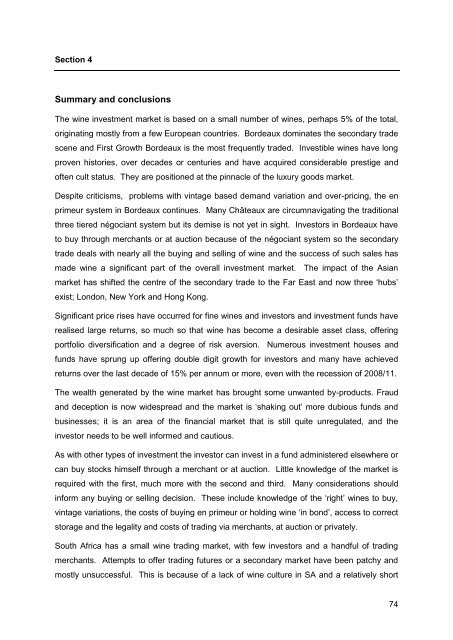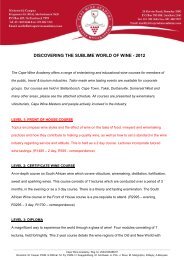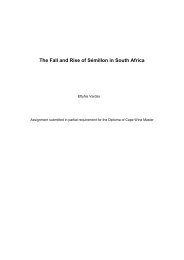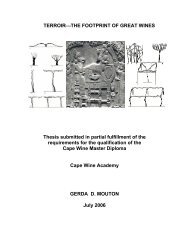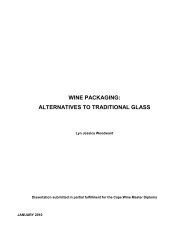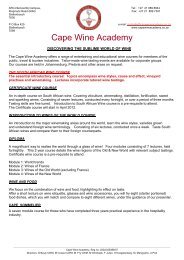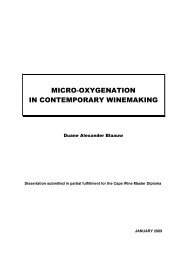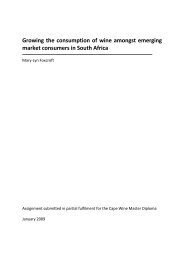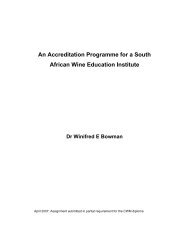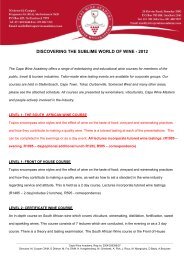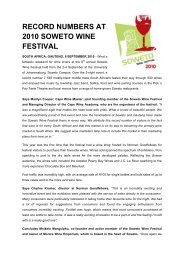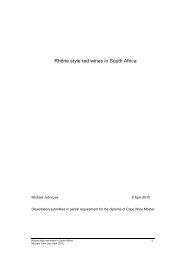Wine Investment in South Africa - Cape Wine Academy
Wine Investment in South Africa - Cape Wine Academy
Wine Investment in South Africa - Cape Wine Academy
Create successful ePaper yourself
Turn your PDF publications into a flip-book with our unique Google optimized e-Paper software.
Section 4<br />
Summary and conclusions<br />
The w<strong>in</strong>e <strong>in</strong>vestment market is based on a small number of w<strong>in</strong>es, perhaps 5% of the total,<br />
orig<strong>in</strong>at<strong>in</strong>g mostly from a few European countries. Bordeaux dom<strong>in</strong>ates the secondary trade<br />
scene and First Growth Bordeaux is the most frequently traded. Investible w<strong>in</strong>es have long<br />
proven histories, over decades or centuries and have acquired considerable prestige and<br />
often cult status. They are positioned at the p<strong>in</strong>nacle of the luxury goods market.<br />
Despite criticisms, problems with v<strong>in</strong>tage based demand variation and over-pric<strong>in</strong>g, the en<br />
primeur system <strong>in</strong> Bordeaux cont<strong>in</strong>ues. Many Châteaux are circumnavigat<strong>in</strong>g the traditional<br />
three tiered négociant system but its demise is not yet <strong>in</strong> sight. Investors <strong>in</strong> Bordeaux have<br />
to buy through merchants or at auction because of the négociant system so the secondary<br />
trade deals with nearly all the buy<strong>in</strong>g and sell<strong>in</strong>g of w<strong>in</strong>e and the success of such sales has<br />
made w<strong>in</strong>e a significant part of the overall <strong>in</strong>vestment market. The impact of the Asian<br />
market has shifted the centre of the secondary trade to the Far East and now three ‘hubs’<br />
exist; London, New York and Hong Kong.<br />
Significant price rises have occurred for f<strong>in</strong>e w<strong>in</strong>es and <strong>in</strong>vestors and <strong>in</strong>vestment funds have<br />
realised large returns, so much so that w<strong>in</strong>e has become a desirable asset class, offer<strong>in</strong>g<br />
portfolio diversification and a degree of risk aversion. Numerous <strong>in</strong>vestment houses and<br />
funds have sprung up offer<strong>in</strong>g double digit growth for <strong>in</strong>vestors and many have achieved<br />
returns over the last decade of 15% per annum or more, even with the recession of 2008/11.<br />
The wealth generated by the w<strong>in</strong>e market has brought some unwanted by-products. Fraud<br />
and deception is now widespread and the market is ‘shak<strong>in</strong>g out’ more dubious funds and<br />
bus<strong>in</strong>esses; it is an area of the f<strong>in</strong>ancial market that is still quite unregulated, and the<br />
<strong>in</strong>vestor needs to be well <strong>in</strong>formed and cautious.<br />
As with other types of <strong>in</strong>vestment the <strong>in</strong>vestor can <strong>in</strong>vest <strong>in</strong> a fund adm<strong>in</strong>istered elsewhere or<br />
can buy stocks himself through a merchant or at auction. Little knowledge of the market is<br />
required with the first, much more with the second and third. Many considerations should<br />
<strong>in</strong>form any buy<strong>in</strong>g or sell<strong>in</strong>g decision. These <strong>in</strong>clude knowledge of the ‘right’ w<strong>in</strong>es to buy,<br />
v<strong>in</strong>tage variations, the costs of buy<strong>in</strong>g en primeur or hold<strong>in</strong>g w<strong>in</strong>e ‘<strong>in</strong> bond’, access to correct<br />
storage and the legality and costs of trad<strong>in</strong>g via merchants, at auction or privately.<br />
<strong>South</strong> <strong>Africa</strong> has a small w<strong>in</strong>e trad<strong>in</strong>g market, with few <strong>in</strong>vestors and a handful of trad<strong>in</strong>g<br />
merchants. Attempts to offer trad<strong>in</strong>g futures or a secondary market have been patchy and<br />
mostly unsuccessful. This is because of a lack of w<strong>in</strong>e culture <strong>in</strong> SA and a relatively short<br />
74


